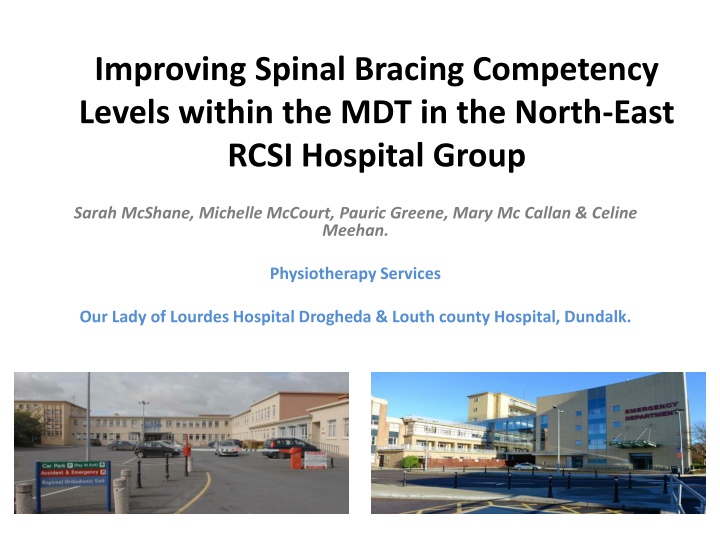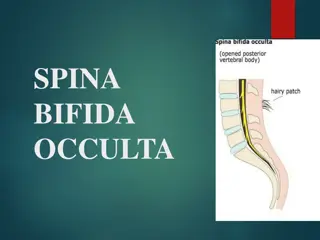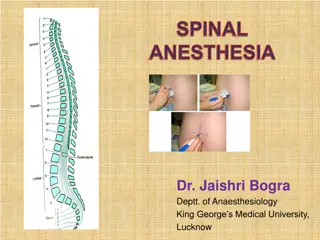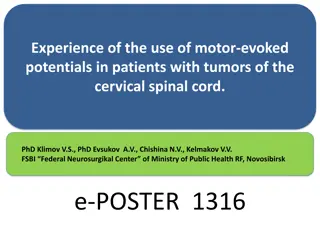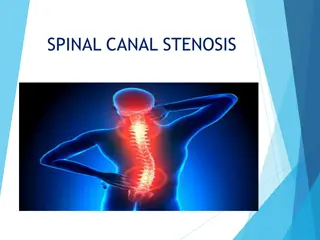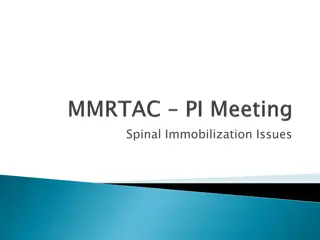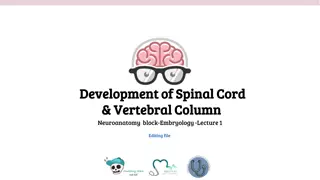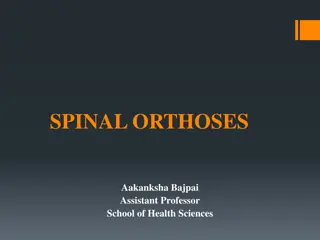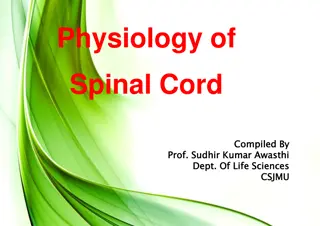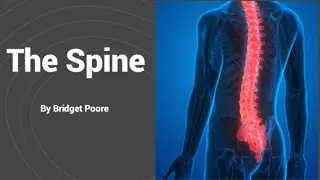Enhancing Spinal Bracing Competency in Healthcare Settings
This quality improvement project aimed to elevate spinal bracing competency among healthcare staff in the North-East RCSI Hospital Group. By focusing on training and upskilling physiotherapy, nursing, and healthcare assistant staff, the project successfully increased knowledge and understanding of spinal fractures management. Through a systematic approach, improvements were sustained by instituting annual compulsory training and extending the program to other hospital sites. The project's success led to enhanced patient care, reduced health risks, and improved patient outcomes.
Download Presentation

Please find below an Image/Link to download the presentation.
The content on the website is provided AS IS for your information and personal use only. It may not be sold, licensed, or shared on other websites without obtaining consent from the author.If you encounter any issues during the download, it is possible that the publisher has removed the file from their server.
You are allowed to download the files provided on this website for personal or commercial use, subject to the condition that they are used lawfully. All files are the property of their respective owners.
The content on the website is provided AS IS for your information and personal use only. It may not be sold, licensed, or shared on other websites without obtaining consent from the author.
E N D
Presentation Transcript
Improving Spinal Bracing Competency Levels within the MDT in the North-East RCSI Hospital Group Sarah McShane, Michelle McCourt, Pauric Greene, Mary Mc Callan & Celine Meehan. Physiotherapy Services Our Lady of Lourdes Hospital Drogheda & Louth county Hospital, Dundalk.
Background/Problem: Our Lady of Lourdes Hospital, Drogheda (OLOL) is currently an acute trauma centre serving Louth, Meath, Cavan, North Dublin & Monaghan. OLOL is the primary hub for the management of non- operative spinal fractures for patients across this area. As part of the management process for this patient cohort, the Orthopaedic physiotherapists are responsible for the supply and fitting of the required thoracic and lumbar spinal braces. Following the acute stage, some patients will require onward referral for rehabilitation/interim-care in other sites, one being The Louth County Hospital (LCH). On discharge from OLOL, these patients will continue to wear their spinal brace and adhere to bracing advice/care for the duration as outlined by the Orthopaedic team. Given that the therapists and nursing staff in LCH don t apply spinal bracing at the initial acute fracture stage and potentially only see this patient cohort intermittently, there is a wide variance in staff experience with respect to brace care/management. Aim: The aim of this project was to improve spinal bracing competency levels amongst all the staff involved in spinal fracture patients care. The aim was to start with LCH physiotherapy staff and thereafter, as appropriate, extend the training to the wider MDT specifically the nursing staff and HCAs. Measurement of Improvement: On completion of the training schedule it was observed that all staff who engaged in the training reported increased knowledge and understanding of spinal fractures demonstrating competency in the complete spinal bracing pathway including the referral process, brace selection, necessary documentation, associated health and safety policies, patient education and discharge options. Pre training, 11-22% of therapists reported competency in the management of spinal fracture patients, thus highlighting the need for up skilling and training. On completion of the two training sessions, 100% of the therapists who engaged in the training reported competency in managing a spinal fracture patient appropriately.
Sustaining Improvements: In order to maintain the staff competency levels it has been agreed with the physiotherapy manager that the physiotherapy staff will be required to comply with annual compulsory spinal brace training. Opportunity for Spread: The initial aim was to focus the training delivery to target physiotherapy staff in LCH, however given the success of the project, expansion was made to offer the training to nursing and HCA staff in the Cottage Community Hospital (CCH). The CCH was another discharge destination for spinal fracture patients, in the Louth catchment area, commencing in early 2021. In addition, it is proposed that training will be extended further again and offered to the physiotherapy staff in Cavan General Hospital (CGH). This is a referring and discharge site for the spinal fracture cohort, and so, in order to optimise patient care, a proposed plan has been made to offer staff training in early 2022. Conclusions: In conclusion, this QI project was successful in achieving its aim. A learning need was identified based on competency levels established at the onset of the project and follow up training was provided thereafter based on this. By completing a full PDSA cycle we were able to achieve 100% competency in staff, at a cross site location, in the management of a spinal fracture patient. This project has paved the way for enhanced patient care, decreased health and safety risks and an improved patient journey. In addition, we have identified a training module which can be employed in other cross sites where similar training needs are identified. 1. Nicolay CR, Purkayastha S, Greenhalgh A, Benn J, Chaturvedi S, Phillips N, et al. Systematic review of the application of quality improvement methodologies from the manufacturing industry to surgical healthcare. Br J Surg. 2012;99(3):324 35. 2. Speroff T, O Connor GT. Study designs for PDSA quality improvement research. Qual Manag Health Care. 2004;13(1):17 32.
